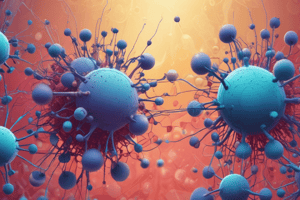Podcast
Questions and Answers
What are nanoparticles?
What are nanoparticles?
Materials with overall dimensions in the nanoscale, i.e., under 100 nm, with unique size-dependent properties.
What are the methods for synthesizing nanoparticles?
What are the methods for synthesizing nanoparticles?
Chemical vapor deposition, physical vapor deposition, and solvothermal synthesis.
How are nanoparticles used in drug delivery?
How are nanoparticles used in drug delivery?
NPs are used as drug carriers due to their unique properties, such as high surface area-to-volume ratio and ease of functionalization.
What is the application of nanoparticles in medical imaging?
What is the application of nanoparticles in medical imaging?
What are the dimensions of nanoparticles?
What are the dimensions of nanoparticles?
What are two industries that nanoparticles are revolutionizing?
What are two industries that nanoparticles are revolutionizing?
What are the two specific areas of tissue regeneration where nanotechnology is being used?
What are the two specific areas of tissue regeneration where nanotechnology is being used?
What is the main environmental and societal challenge associated with nanoparticles?
What is the main environmental and societal challenge associated with nanoparticles?
In what area are nanoparticles increasingly used to boost chemical reactions?
In what area are nanoparticles increasingly used to boost chemical reactions?
What is the expectation regarding the role of nanoparticles in modern technology and medicine as research continues to advance?
What is the expectation regarding the role of nanoparticles in modern technology and medicine as research continues to advance?
Flashcards are hidden until you start studying
Study Notes
Nano Materials and Technology: A Comprehensive Overview
Nanotechnology is a rapidly evolving field that deals with nano-meter sized objects, and nanoparticles (NPs) are a crucial aspect of this technology. NPs have unique size-dependent properties, making them suitable for various applications in biology, medicine, and other industries. This article will discuss the properties, applications, and challenges of nanoparticles in modern medicine, drug delivery, and other fields.
Properties and Synthesis of Nanoparticles
Nanoparticles are materials with overall dimensions in the nanoscale, i.e., under 100 nm. Their size-dependent physical and chemical properties make them ideal for a wide range of applications. NPs can be synthesized using various methods, such as chemical vapor deposition, physical vapor deposition, and solvothermal synthesis.
Applications of Nanoparticles in Biology and Medicine
Nanoparticles have found numerous applications in biology and medicine, including:
- Drug Delivery: NPs are used as drug carriers due to their unique properties, such as high surface area-to-volume ratio and ease of functionalization.
- Medical Imaging: Nanoparticles, such as quantum dots, are used in medical imaging for site-specific imaging in vivo.
- Tissue Regeneration: Nanotechnology is being used for tissue regeneration, including bone and neural tissue engineering.
- Catalysis: Nanoparticles are increasingly used in catalysis to boost chemical reactions, reducing the quantity of catalytic materials necessary and saving money.
Challenges and Future Prospects
Despite the promising applications of nanoparticles, there are also environmental and societal challenges, particularly concerning their toxicity. However, researchers are working to address these challenges and develop safer and more effective nanoparticle-based technologies.
In conclusion, nanoparticles are revolutionizing various industries, including biology, medicine, and materials science. Their unique properties and versatility make them ideal for a wide range of applications, from drug delivery to medical imaging and tissue regeneration. As research continues to advance, it is expected that nanoparticles will play an increasingly significant role in modern technology and medicine.
Studying That Suits You
Use AI to generate personalized quizzes and flashcards to suit your learning preferences.




